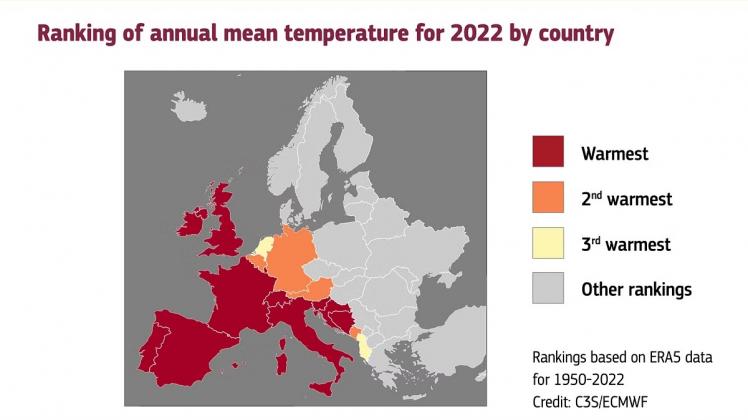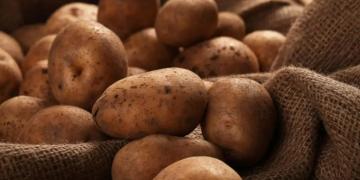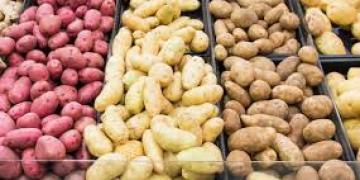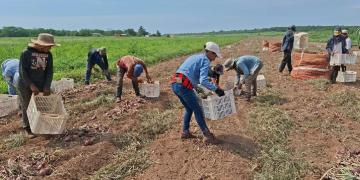Clima: The Rise of Global Temperature and How It Affects Potato Production
From melting glaciers and flooding to drought, rising global temperature is affecting agriculture in many ways. Potato production is also taking a hit.

The year 2022 saw record-breaking temperatures across Europe and around the world, according to data from the Copernicus Climate Change Service. The global temperature was 0.91°C above the pre-industrial level, breaking the previous record set in 2016.
In Europe, the temperature was 1.47°C above the pre-industrial level, breaking the previous record set in 2019. These record-breaking temperatures underscore the urgent need for action to address the global climate crisis.
According to the latest report, 2022 was the second-warmest year on record globally, after 2016. The temperature was driven by a combination of natural climate variability and human-induced climate change.
The report states that human activities, including the burning of fossil fuels and deforestation, are the primary cause of the current warming trend.
The report also highlights the impacts of the warming temperatures. In Europe, the heatwaves and droughts of 2022 had a significant impact on agriculture and water resources.
In the United States, extreme heat and drought led to crop failures and wildfires. In Australia, the hot and dry conditions contributed to a severe bushfire season.
The impact of climate change on global agriculture especially is an issue of increasing concern as temperatures rise and weather patterns become more unpredictable.
In particular, potato production is vulnerable to the effects of climate change due to its sensitivity to temperature and precipitation. A recent study investigates the potential impact of climate change on potato production and identifies potential mitigation measures to minimize its negative effects.
Potato is a temperate crop and is widely grown in many regions of the world, particularly in Europe, North America, and Asia. It’s known for its high nutritional value and is an important staple food for many people globally.
However, potato production is sensitive to temperature and precipitation, and changes in these climatic factors can have a significant impact on yields and quality.
In regions where temperatures are expected to rise, potato yields are likely to decline due to heat stress, while in regions with increased precipitation, there is a greater risk of fungal diseases, such as late blight, which can cause significant damage to crops.
The study identifies several potential mitigation measures that can help to minimize the negative impacts of climate change on potato production.
These include the use of new potato varieties that are more resistant to heat and drought, the development of better irrigation systems to cope with changing precipitation patterns, and the use of new agricultural practices that improve soil health and reduce the need for chemical fertilizers and pesticides.
One potential is the use of precision agriculture techniques, such as remote sensing and GPS mapping, to optimize the use of resources and minimize the environmental impact of potato production.
These techniques can help farmers to identify areas of their fields that are most susceptible to climate-related stress, such as heat or drought, and adjust their planting and irrigation practices accordingly.
Another potential solution is the adoption of agroforestry practices, which involve the cultivation of trees alongside crops.
Agroforestry can help to improve soil health, reduce erosion, and provide shade and protection from extreme temperatures, all of which can help to mitigate the negative effects of climate change on potato production.
Many regions that are vulnerable to the effects of climate change are also highly reliant on potato production, and international cooperation is necessary to share knowledge and resources and develop effective adaptation and mitigation strategies.
The impact of climate change on potato production is a growing concern for global agriculture, and the potential consequences of climate change for potato yields and quality are significant.
Can help to minimize the negative effects of climate change and ensure the continued production of this important staple food. The record-breaking temperatures of 2022 are part of a long-term warming trend that is already having significant impacts on the planet.
According to the Intergovernmental Panel on Climate Change, the global temperature is projected to increase by 1.5°C above the pre-industrial level by the mid-2030s, and by 2°C by the end of the century.
This level of warming will have severe consequences for the planet, including sea-level rise, more frequent and intense heat waves and droughts, and more severe weather events.
To address the global climate crisis, urgent action is needed to reduce greenhouse gas emissions and transition to a low-carbon economy. This will require a comprehensive approach that includes policies to promote energy efficiency, renewable energy, and sustainable transportation.
It will also require international cooperation and coordination to ensure that all countries are taking action to reduce their greenhouse gas emissions.
The European Union has taken a leading role in addressing the global climate crisis. In December 2021, the European Commission announced a package of climate policies and measures aimed at achieving the goal of net-zero greenhouse gas emissions by 2050.
The package includes a range of policies and measures, including a carbon border adjustment mechanism, a new renewable energy target of 40% by 2030, and a new emissions reduction target of at least 55% by 2030.
Source
PotatoPro
Fuente: https://www.potatopro.com/news/2023/rise-global-temperature-and-how-it-affects-potato-production




